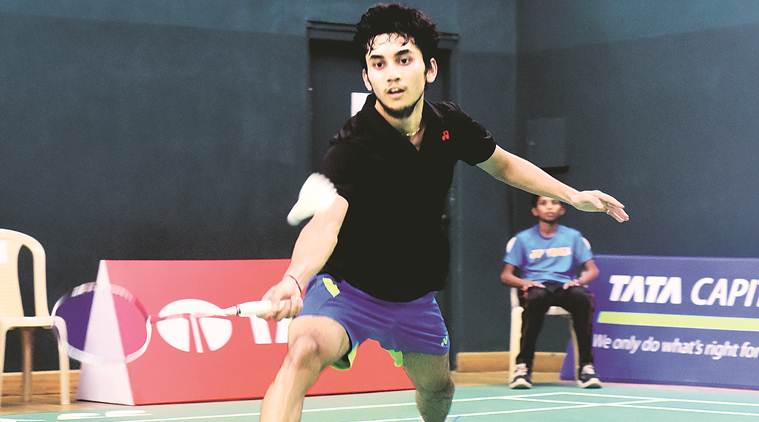 Lakshya Sen, 17, lost to China’s Li Shifeng in the final of the Youth Olympics.
Lakshya Sen, 17, lost to China’s Li Shifeng in the final of the Youth Olympics.
Coach Vimal Kumar remembers a young, scrawny Lakshya Sen once handing him a scrawl on a chit. It was a statement of purpose in his sophomore sub-junior season. Lakshya, playing doubles with Bodhit Joshi, had lost a bunch of times to another pairing in the age category, and the youngster had insisted that when he headed to Hyderabad for the upcoming Nationals, the duo he’d lost to would be marked men. It was a rare proactive preamble from the usually phlegmatic boy. He would deliver on the actual dartboard, scalping the opponents.
Lakshya was up against Li Shifeng in the Youth Olympics final over the weekend, and had lost to the Chinese twice before. Then he’d beaten him at the Asian Championship where he went on to win the title. As the Indian moves into the Seniors next year, plenty of post-its with names of opponents he ought to avenge are going to pile up on his wall, or in the diary he diligently maintains replacing the chits of yore.
The 21-15, 21-19 loss in Buenos Aires against the Chinese youngster is one chapter of a rivalry that will start playing out in the seniors soon enough. For someone dubbed India’s next big thing in badminton, how Lakshya responds to the losses – his bouncebackability – will be crucial. “Even back then in the sub-juniors, Lakshya and his partner had lost to the pairing in close matches. He badly wanted to win against them. He gave me that small chit saying I want to beat them and then went to Hyderabad where he made his point,” Vimal recalls.
The Youth Olympic silver has been testament to the youngster’s drive to succeed. The future though will continue to dissect his losses, especially the banana skins he seems to repeatedly slip up on.“He takes big leads and then anxiety sets in. He’s faltered many times at that juncture. In the semis against Kodai Naraoka, he showed good body language (fighting out for a tough three-set win, 24-22 in the third). But sometimes in between, he loses focus. We’ve started getting a psychologist, Miss Janhavi from Pune, to work with him more often. He still has a long way to go,” Vimal adds.
The prologue to this long journey took place in Bangalore, where Lakshya has trained for years with Vimal and Prakash Padukone. “It was the year we decided to graduate our seniors out, the likes of Anup Sridhar and Arvind Bhat, and get the little ones in. There were eight boys who showed promise,” Vimal recalls. This crop included Pratul Joshi and Aditya Joshi, Chirag and Lakshya Sen, as well as Rahu Bharadwaj, Karthikeya Gulshan, and later Kiran George and Meiraba Meisnam.\
“He came with his elder brother to Bangalore and we thought he was too young to be separated from his parents. But he insisted on staying on,” Vimal remembers the youngster’s eagerness at not more than nine. “He showed good spirit and temperament. Plus his shot selection was impressive, and the net game was good. He of course didn’t have strength so raising basic endurance needed work,” he added.
What impressed Padukone was Lakshya’s ability to grasp advice and implement it, and his diligence in pushing himself into a regimen — without coaches or seniors prodding. “While his brother Chirag was more talented and had more strokes, Prakash noted that Lakshya’s temperament was different from others – he could implement changes,” Vimal adds.
Need to focus
Though the biggest challenge going forward for Lakshya seems to be this very ability to apply these instructions in match situations. “Till the last point he needs to focus,” Vimal says.
Lakshya has lost far too many matches in the last year from a position of dominance, and the Asian title clearly hadn’t stemmed the tide entirely. In the final, the Chinese would stay in charge never losing the lead, pointing to a chasm that can widen as Lakshya proceeds to the seniors.
“Prakash has told him the importance of proving himself in Asia. There’s tournaments in Indonesia, Korea and China where he will need to show his mettle over a period of time, which is far different from what he has been achieving till now in Europe. We keep telling him not to chase rankings mindlessly, neglecting strength and fitness. So after the Junior World Championships next month, we intend to get him to move into the seniors from next year,” Vimal adds.
His troubles while he shoots up in height and the ensuing injuries are well documented, and Vimal warns that medals like a silver at the Youth Olympics mean there’s danger of him trying to rush the transition into seniors, where losses can pile up early on. “His body’s changing and it’s important not to overdo things also,” he adds, as a caution.